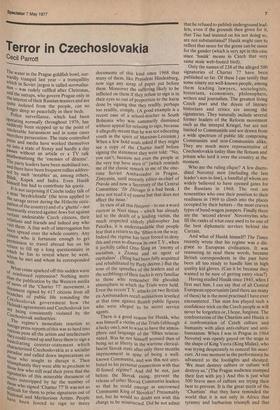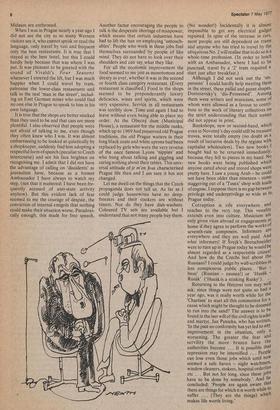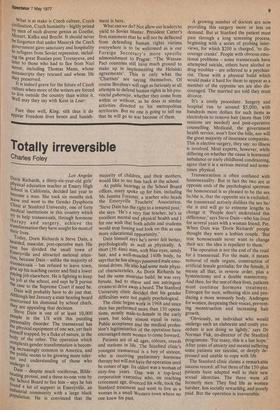Terror in Czechoslovakia
Cecil Parrott
The water in the Prague goldfish bowl, outwardly tranquil last year — a tranquillity w. Inch in Soviet jargon is called normalisati°n — was rudely ruffled after Christmas, and the satraps, who govern Prague only in the interest of their Russian masters and are quite isolated from the people, can no longer sleep so peacefully in their beds. Police surveillance, which had been °Perating normally throughout 1976? has Suddenly been stepped up to the point of Intolerable harassment and in some cases merciless persecution. The state-controlled Press and media have worked themselves Up into a state of frenzy and hardly a day Passes without an article or a TV talk anathematising the 'enemies of detente'. .rhe party leaders have been mobilised too, and there have been frequent rallies addressed by such 'notables' as, among others,
Kapek and Indra. Even Husak nitnself has had to contribute his quota.
It IS not surprising if Czechs today talk of a Mini 'heydrichiada' (the term applied to the savage terror during the Hitlerite occuPation of the country) and of a 'ghetto' —not necessarily erected against Jews but against Certain undesirable Czech citizens, their relations and friends and indeed any who v, Isit them. A fine web of interrogation has nee. n k Spread over the whole country. Any citizen who is fortunate enough to get rrnission to travel abroad has on his
r
etu. in to fill up a long questionnaire in Which he has to reveal where he went, ont he met and whom he corresponded with.
What crime sparked off this sudden wave reinforced repression? Nothing more 'flan the publication by the Western media °,if news of the 'Charter 77' movement, a retiment signed by 617 citizens from all ("ranches of public life reminding the k:.,zechoslovak government how the 1:lelsinki agreements and Czechoslovak law ',re being consistently violated by the k-zechoslovak authorities. f The regime's immediate reaction. to, v°reign press reports of this was to herd into
various pens all the artists and intellectuals
htleY could round up and force them to sign a nniliating counter-statement which enaracterised Czechoslovakia as a socialist
Ptkaradise and called down imprecations on
tu9se who sought to disrupt it. Then trhannphantly they were able to.proclaim to Si °se few who still read their press that the tIgnatories of this miserable document of theirs outstripped by far the number of d.,°se who signed 'Charter 77' It was not so s(k,lificult for them to prise signatures out of h"atl°nal and Meritorious Artists. People aye been forced to sign so many documents of this kind since 1968 that many of them, like President Hindenburg, now sign any scrap of paper put before them. Moreover the suffering likely to be inflicted on them if they refuse to sign is in their eyes so out of proportion to the harm done by signing that they readily, perhaps too readily, comply. (A good example is a recent case of a school-teacher in South Bohemia who was summarily dismissed without appeal for refusing to sign, because it allegedly meant that he was not educating youth in the spirit of Marxism-Leninism.) When a few bold souls asked if they might see a copy of the Charter itself before signing the statement they were told: "No, you can't, because not even the people at the very top have seen it" (which reminds me of the classic remark to me of the onetime Soviet Ambassador in Prague, Zimyanin, until recently editor-in-chief of Pravda and now a Secretary of the Central Committee: 'Dr Zhivago is a bad book. I have not read it of course but that does not affect the issue.'
In view of all this Hetzerei — to use a word current in Nazi times — which has already led to the death of a leading victim, the much respected elderly philosopher Jan Patoeka, it is understandable that people fear that a return to the 'fifties is on the way. Indeed the regime has been forced to deny this and even to disavow its own T.V., when it joyfully called Otto Sling an 'enemy of • socialism, a Zionist and an agent of capitalism' . (Sling had been fully acquitted and rehabilitated by party decree.) But the
tone of the speeches of the leaders and of the scribblings of their hacks is very familiar to those who remember the ghoulish
atmosphere in which the Trials were held. Even the recent T.V. attacks on two British ex-Ambassadors recall accusations levelled at that time against British public figures who• were alleged to be secret service agents.
There is a good reason for Husak, who was himself a victim of the Trials (although a lucky one), not to want to have the atmos phere and language of the 'fifties reincar nated. Was he not himself accused then of being set at liberty in the wartime clerical fascist Slovak state after only three months imprisonment in spite of being a wellknown Communist, and was this not attri buted to his personal connections with that
ill-famed regime? And did he not, just before the Slovak rising, prevent the
release of other Slovak Communist leaders so that he could emerge as uncrowned Communist King of Slovakia? Presumably not, but he would no doubt not wish this charge to be resurrected. Did he not admit that he refused to publish underground leaflets, even if the grounds then given for it, that Tiso had insisted on his not doing so, are not substantiated? Husak might care to reflect that sauce for the goose can be sauce for the gander (which is very apt in this case since 'husak' means in Czech that very same male web-footed bird).
Only the names of 238 of the alleged 500 signatories of Charter 77 have been published so far. Of these I can testify that some ninety are well-known people, among them leading lawyers, sociologists, historians, economists, philosophers, writers and journalists. The greatest living Czech poet and the doyen of literary historians and critics are among the signatories. They naturally include several former leaders of the Reform movement such as the intrepid, Kriegel, but are not limited to Communists and are drawn from a wide spectrum of public life comprising Communists and non-Communists alike. They are much more representative of Czechoslovakia today than the flotsam and jetsam who lord it over the country at the moment.
Who are the ruling clique? A few discredited Novotny men (including the late leader's son-in-law), a handful of whom are widely believed to have opened gates for the Russians in 1968. The rest are nonentities who owe their position to their readiness in 1969 to climb into the places occupied by their betters — the most craven types of band-wagon jumpers. Finally there are the 'second eleven' Novotnyites who fill the ranks of what once used to be one of the best diplomatic services behind the Curtain.
And what of Husak himself? The Times
recently wrote that his regime was a dis grace to European civilisation. It was reassuring to read these words, because British correspondents in the past have been all too ready to handle him in high quality kid gloves. (Can it be because they wanted to be sure of getting entry visas?) Having studied Husak since 1945, when I first met him, I can say that of all Central European opportunists (and there are many of them) he is the most practised I have ever encountered. This man has played such a confidence trick on the Czech people as will never be forgotten or, I hope, forgiven. The confrontation of the Chartists and Husak is a confrontation of Czech culture and humanity with alien anti-culture and antihumanism. When I was in Prague in 1964 Novotny was openly guyed on the stage in the shape of King Vavra (King Midas), who was trying desperately to conceal his asses' ears. At one moment in the performanCe he advanced to the footlights and shouted: 'We must destroy culture or culture will destroy us.' (The Prague audience stamped their feet with joy.) And this is just what 500 brave men of culture are trying their best to prevent. It is the great merit of the "Chartists' that they have reminded the world that it is not only in Africa that tyranny and barbarism triumph and that Midases are enthroned.
When I was in Prague nearly a year ago I did not see the city as so many Western visitors see it, who cannot speak or read the language, only travel by taxi and frequent only the best restaurants. It is true that I stayed at the best hotel, but this I could hardly help because that was where I was put. It was pleasant to be greeted with the sound of Vivaldi's Four Seasons whenever I entered the lift, but I was much happier when I could travel by tram, patronise the lower-class restaurants and talk to the real 'man in the street', including an East German miner who could find no one else in Prague to speak to him in his own language.
It is true that the shops are better stocked than they used to be and that cars are more plentiful. I also observed that people were not afraid of talking to me, even though they often knew who I was. It was almost embarrassing to be looked at quizzically by a shopkeeper, suddenly find him adopting a respectful form of speech (peculiar to Czech intercourse) and see his face brighten on recognising me. I admit that I did not have the advantage of calling on 'dissidents' as journalists have, because as a former Ambassador I have always to watch my step, (not that it mattered: I have been frequently accused of anti-state activity anyhow). But this evident lack of fear seemed to me the courage of despair, the conviction of internal emigres that nothing could make their situation worse. Paradoxically enough, this made for free speech. Another factor encouraging the people to talk is the desperate shortage of manpower, which means that certain industries have had to lift the ban on employing 'untouchables'. People who work in these jobs find themselves surrounded by people of like mind. They do not have to look over their shoulders and can say what they like.
For all the economic improvement the food seemed to me just as monotonous and dreary as ever, whether it was in the second or fourth class category restaurant. (Every restaurant is classified.) Food in the shops seemed to be preponderantly luxury delicacies, wines and spirits, which were very expensive. Service in all restaurants was terribly slow. Time and again I had to leave without even being able to place my order. At the Obecny dum (Municipal House), a restaurant for the middle ranks,' which up to 1969 had preserved old Prague traditions, the old Prague waiters in their long black coats and white aprons hadbeen replaced by girls who were the very reverse of the once famous Lyons `nippies' and who hung about talking and giggling and caring nothing about their tables. This universal attitude of je m'en fous characterised Prague life then and I am sure it has not changed.
Let me dwell on the things that the Czech propaganda does not tell us. As far as I could judge housewives have no deepfreezers and their cookers are without timers. Nor do they have dish-washers. Coloured TV sets are available but I understand that not many people buy them. (No wonder!) Incidentally it is almost impossible to get any electrical gadget repaired. In spite of the increase in cars, most people are still dependent on trams and anyone who has tried to travel by the ubiquitous No. 2 will realise that to do s015 a whole-time profession. (In order to lunch with an Ambassador, where I had to be punctual, travel by a '2' tram required a start just after breakfast.)
Although I did not seek out the 'U'' persons' I could hardly help meeting them in the street, these pallid and gaunt shapes, Dostoievsky's `dis-Possessed'. Among them were writers and musicians, some of whom were allowed as a favour to contribute to the work of literary collectives on the strict understanding that their names did not appear in print.
Bookshops, new or second-hand, which even in Novotny's day could still be treasure troves, were totally empty (no doubt as a result of lucrative deals by the regime
with capitalist wholesalers). Two new books I bought had to be returned immediately, because.they fell to pieces in my hand. No new books were being published which anyone cared about and record shops were pretty bare. I saw a young Arab — he could not have been older than nineteen — come staggering out of a `Tusex' shop with loads of cognac. I suppose there is no gap between privilege and underprivilege so wide as in' Prague today.
Corruption is rife everywhere and reaches to the very top. This venality extends even into culture. Musicians are only given visas abroad or engagements at home if they agree to perform the works of seventh-rate composers. Informers are everywhere and they are well paid. And what informers! If Svejk's Bretschneider were to turn up in Prague today he would be almost regarded as a respectable citizen! And how do the Czechs feel about the Russians? I could judge by wall-scribbles in less conspicuous public places. 'Rus hnus' (Russian — nausea!) or 'Husak Rusak' ('Husak is a stinking Rusky').
Returning to the Hetzerei one may, well ask: since things were not quite so bad a year ago, was it really worth while for the 'Chartists' to start all this commotion for a cause which might be thought to be doomed to run into the sand? The answer is to be found in the last will of the civil rights leader and martyr, Jan Patocka, who has written, 'In the past no conformity has yet led to anY improvement in the situation, only a worsening. The greater the fear and servility the more brazen have the authorities become . . . It is possible that repression may be intensified . . PeoPic can lose even those jobs which until 0ØW seemed a safe haven — night watchmen, window cleaners, stokers, hospital orderlies etc .. . But not for long, since these jobs have to be done by , somebody.' And he concluded: 'People are again aware that there are things for which it is worth while t° suffer . . . (They are the things) which makes life worth living.'
What is at stake is Czech culture, Czech civilisation, Czech humanity — highly prized by men of such diverse genius as Goethe, Mozart, Kafka and Brecht. It should never be forgotten that under Masaryk the Czech government gave sanctuary and hospitality to refugees from Soviet repression, includmg the great Russian poet Tsvetayeva, and later to those who had to flee from Nazi terror, including Thomas Mann, whose manuscripts they rescued and whose life they preserved.
It is indeed grave for the future of Czech culture when more of the writers are forced to live outside the country than within it. Well may they say with Kent in Lear: Fare thee well, King: sith thus it do appear Freedom lives hence and banish '. ment is here.
What can we do? Not allow our leaders to yield to Soviet bluster. President Carter's firm statement that he will not be deflected from defending human rights victims everywhere is to be welcomed as is our Foreign Secretary's more specific admonishment to Prague: "The Warsaw Pact countries still have much ground to make up in implementing the Helsinki agreements'. This is only what the 'Chartists' are saying themselves. Of course Brezhnev will rage as furiously at all attempts to defend human rights in his provincial guberniye, whether they come from within or without, as he does at similar activities directed to his metropolitan territories. But no one is going to tell me that he will go to war because of them.








































 Previous page
Previous page